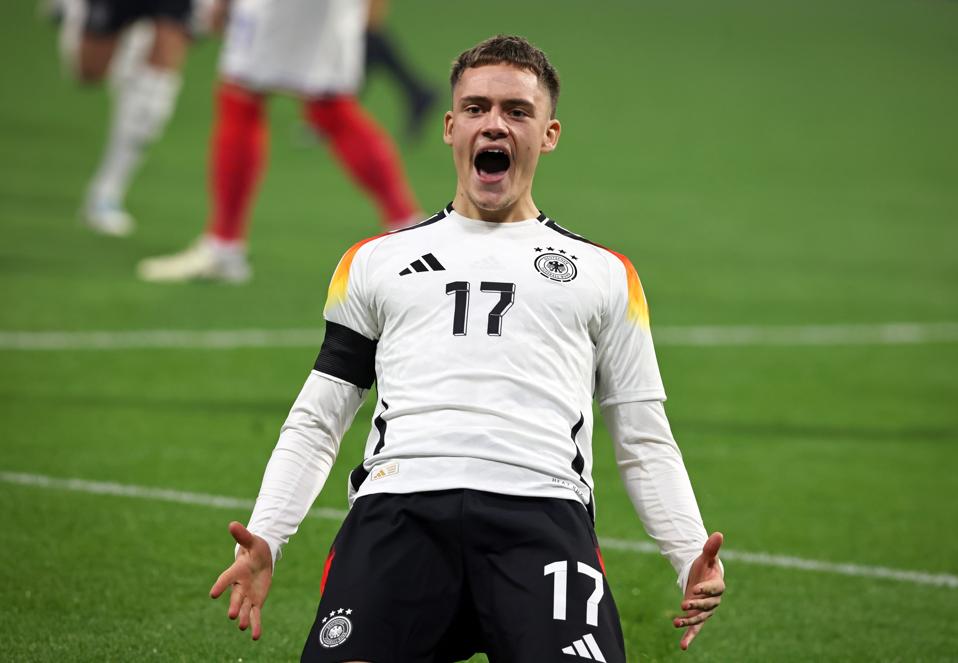Julian Nagelsmann’s revolution took just eight seconds to take off. With the first shot of the game of the game, Florian Wirtz scored a fantastic goal to give Germany the lead over France on Saturday. It was not only Wirtz’s first goal for his country but also the fastest goal in Germany’s history. Then, in the second half, it took four minutes for Kai Havertz to score Germany’s second and secure a dominant 2-0 victory over the 2018 World Cup winners.
More important than the result, Bundestrainer Nagelsmann had his selection spot on for the first friendly since the disastrous November friendlies in which Germany lost 2-3 to Turkey and 2-0 to Austria. Those results caused Nagelsmann to rethink everything, calling up six new players and convincing Real Madrid star Toni Kroos to return to the national team.
Kroos’ impact was immediate. Forming a double-6 in midfield with Leverkusen’s Robert Andrich, Kroos dictated Germany’s game, giving it structure in defense and allowing young guns and Jamal Musiala and Wirtz to be creative in attack. Subbed off in the 89th minute, the Real star finished the game with 121 out of 128 completed passes, 143 touches, and 100% won tackles. Kroos also provided the assist for the Wirtz goal.
“Unbelievable, to be honest,” Nagelsmann said about Kroos’ comeback. “With the ball, we all know that he is an extraordinary player. But also how he got involved in duels. The areas that he was criticized for in the past. He worked incredibly hard and was defensively stable. What I like is that you can’t tell he’s a very successful player – he’s quite a normal guy and integrates into the group.”
Indeed, with Kroos back in the side, the squad was more balanced. This also forced Joshua Kimmich out to the right-back position. After spending an entire year trying to convince his club coach Thomas Tuchel that he is a no.6, Kimmich highlighted that in truth he is a world-class right-back neutralizing PSG star Kylian Mbappé on his flank.
Kimmich wasn’t the only one forced into a new role by Kroos’ return. With Nagelsmann opting to pair Kroos with the more physical Andrich, captain Gündoğan was pushed further up the pitch, occupying the space between Wirtz and Musiala.
The Barca playmaker didn’t have his best game but still gave Germany structure in the attack that has been missing for months if not years. According to Wyscout, Gündoğan went into the match leading all midfielders in any of Europe’s top five leagues with 22 key passes and the plan to have his structure allow Musiala and Wirtz to roam certainly worked out.
Then there is Havertz. Havertz has long struggled to find a proper role in the national team, but a recent run under Arsenal manager Mikel Arteta has made him one of the most dangerous no.9s in Europe. Nagelsmann has also taken note and started Havertz as a striker ahead of Niclas Füllkrug and Deniz Undav. The Gunner thanked his national team coach with a goal.
Kroos back, Kimmich as a right-back, Gündoğan between Musiala and Wirtz, and Havertz as no.9. Those changes all made a fundamental difference against France. But they weren’t Nagelsmann’s only changes.
Stuttgart’s left-back, Maximilian Mittelstädt, often got involved in the attack and, with his speed, provided an interesting counterbalance to the more structured Kimmich on the other flank. Meanwhile, Jonathan Tah and Antonio Rüdiger, although heavily supported by a solid midfield, got the job done in defense for Germany.
Nagelsmann also made the right substitutions. Rather than making defensive changes, he kept pressing the matter, bringing on Füllkrug for Musiala and Undav for Havertz in the 80th minute. Undav then, shortly after, almost made it 3-0.
“Big compliment to the team, that was very, very good,” a visibly relieved Nagelsmann said in the post game match conference. “The first 25 minutes were very good. Maybe we could have scored one more goal. The kick-off was planned that way, it was excellently prepared by our set piece coach Mads Buttgereit and then was executed well. We improved again in the second half and had three or four really good chances. Even when we made subs, Deniz Undav and Maxi Mittelstädt had two great chances. In the end I’m very, very satisfied.”
In other words, Nagelsmann went all in with his selection, and his gamble has paid off. But the job is only partly done. Germany will not only have to confirm this performance against the Netherlands on Mar. 26 but also take the momentum to this summer when Nagelsmann’s team will play host at Euro 2024.
Manuel Veth is the host of the Bundesliga Gegenpressing Podcast and the Area Manager USA at Transfermarkt. He has also been published in the Guardian, Newsweek, Howler, Pro Soccer USA, and several other outlets. Follow him on Twitter: @ManuelVeth and on Threads: @manuveth

